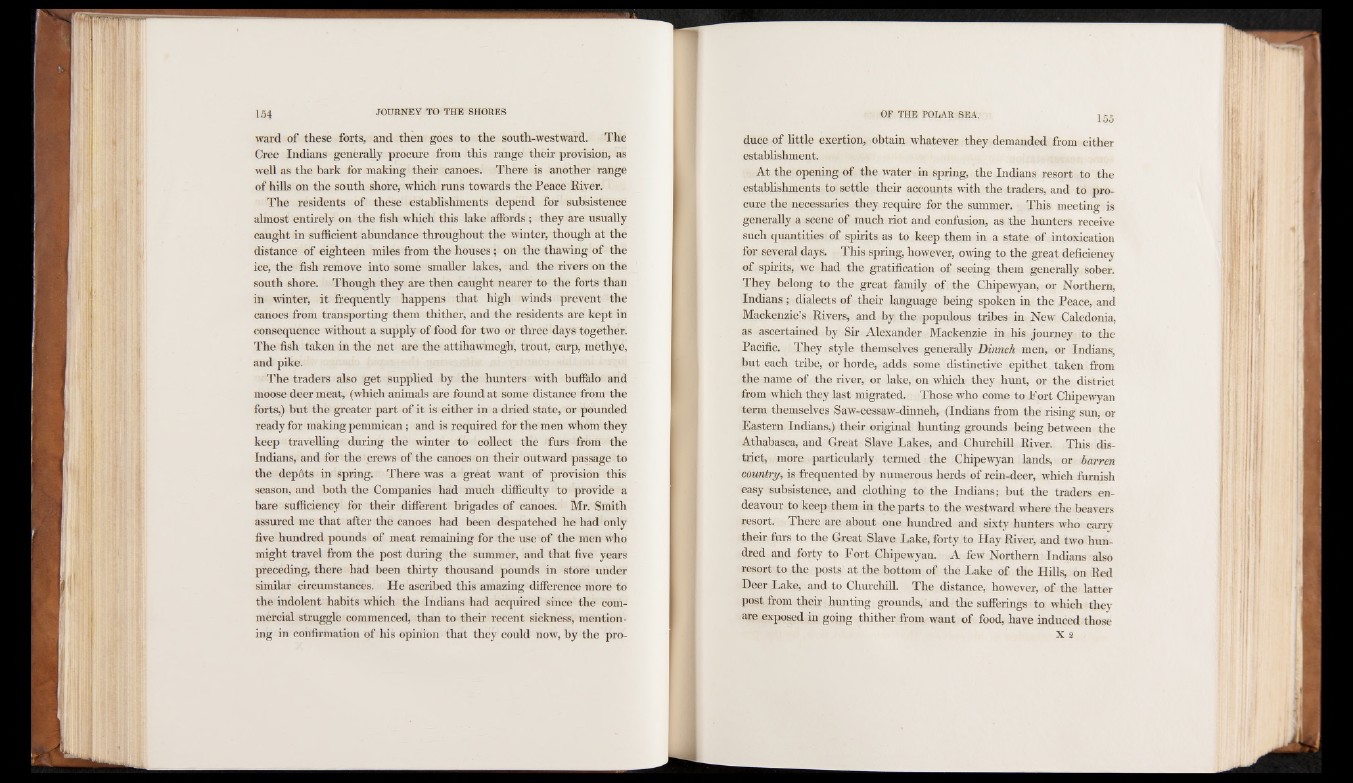
ward of these forts, and then goes to the south-westward. The
Cree Indians generally procure from this range their provision, as
well as the bark for making their canoes. There is another range
of hills on the south shore, which runs towards the Peace River.
The residents of these establishments depend for subsistence
almost entirely on the fish which this lake affords ; they are usually
caught in sufficient abundance throughout the winter, though at the
distance of eighteen miles from the houses ; on the thawing of the
ice, the fish remove into some smaller lakes, and the rivers on the
south shore. Though they are then caught nearer to the forts than
in winter, it frequently happens that high winds prevent the
canoes from transporting them thither, and the residents are kept in
consequence without a supply of food for two or three days together.
The fish taken in the net are the attihawmegh, trout, carp, methye,
and pike.
The traders also get supplied by the hunters with buffalo and
moose deer meat, (which animals are found at some distance from the
forts,) but the greater part of it is either in a dried state, or pounded
ready for making pemmican; and is required for the men whom they
keep travelling during the winter to collect the furs from the
Indians, and for the crews of the canoes on their outward passage to
the depdts in spring. There was a great want of provision this
season, and both the Companies had much difficulty to provide a
bare sufficiency for their different brigades of canoes. Mr. Smith
assured me that after the canoes had been despatched he had only
five hundred pounds of meat remaining for the use of the men who
might travel from the post during the summer, and that five years
preceding, there had been thirty thousand pounds in store under
similar circumstances. H e ascribed this amazing difference more to
the indolent habits which the Indians had acquired since the commercial
struggle commenced, than to their recent sickness, mentioning
in confirmation of his opinion that they could now, by the produce
of little exertion, obtain whatever they demanded from either
establishment.
At the opening of the water in spring, the Indians resort to the
establishments to settle their accounts with the traders, and to procure
the necessaries they require for the summer. This meeting is
generally a scene of much riot and confusion, as the hunters receive
such quantities of spirits as to keep them in a state of intoxication
for several days. This spring, however, owing to the great deficiency
of spirits, we had the gratification of seeing them generally sober.
They belong to the great family of the Chipewyan, or Northern,
Indians ; dialects of their language being spoken in the Peace, and
Mackenzie’s Rivers, and by the populous tribes in New Caledonia,
as ascertained by Sir Alexander Mackenzie in his journey to the
Pacific. They style themselves generally Dinneh men, or Indians,
but each tribe, or horde, adds some distinctive epithet taken from
the name of the river, or lake, on which they hunt, or the district
from which they last migrated. Those who come to Fort Chipewyan
term themselves Saw-eessaw-dinneh, (Indians from the rising sun, or
Eastern Indians,) their original hunting grounds being between the
Athabasca, and Great Slave Lakes, and Churchill River. This district,
more particularly termed the Chipewyan lands, or barren
country, is frequented by numerous herds of rein-deer, which furnish
easy subsistence, and clothing to the Indians; but the traders endeavour
to keep them in the parts to the westward where the beavers
resort. There are about one hundred and sixty hunters who carry
their furs to the Great Slave Lake, forty to Hay River, and two hundred
and forty to Fort Chipewyan. A few Northern Indians also
resort to the posts at the bottom of the Lake of the Hills, on Red
Deer Lake, and to Churchill. The distance, however, of the latter
post from their hunting grounds, and the sufferings to which they
are exposed in going thither from want of food, have induced those
X 2